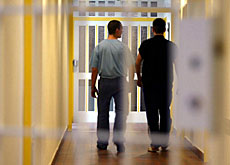
Lifelong imprisonment provisions spelt out

The government says a new law on lifelong imprisonment will not allow retrospective sentencing, to comply with the European convention on human rights.
The conditions it sets for the sentencing of dangerous criminals are more lenient than those sought by the reform initiators, who secured the backing of the people in a February 2004 vote.
Contrary to the wishes of campaigners for harsher sentencing, the new penalty of life imprisonment cannot be applied to cases retrospectively.
The people’s initiative was launched by a group of crime victims and families of victims. They collected over 194,000 signatures, almost double the number required to submit an initiative.
Those behind the initiative, which had the backing of the rightwing People’s Party, wanted offenders found guilty of sexual and violent crimes to be handed lifelong sentences if they failed a one-off psychological assessment at the time of conviction.
Although the government, including Justice Minister Christoph Blocher, rejected the proposals contained in last year’s initiative, the public approved them in a referendum.
New referendum?
In drawing up the legislation, the government had to negotiate a path between the initiative campaigners, who threatened to force another referendum on the issue, and the advice of legal experts.
The initiators of the reform are unhappy with the government’s interpretation of their initiative and now say a second referendum on the issue is likely.
“We cannot accept the transformation of our proposal, as envisaged by the government,” the president of the committee Anita Chaaban said.
According to a government statement, the new law will allow “society to be better protected against very dangerous and untreatable offenders, without contravening the principles of the European Convention on Human Rights”.
The text, which still has to be examined by parliament, determines a list of offences where a penalty of life imprisonment may be applied.
These crimes include assassination, murder, grievous bodily harm, armed robbery, rape, illegal confinement or kidnap. Human trafficking and genocide have been added to the list, in addition to the crimes mentioned in the initiative.
Conditions
Before handing down a life sentence, a judge must take into consideration the opinions of two independent experts. The court has to establish whether it is “highly likely that the offender will commit another similar crime”.
The criminal must also be “untreatable” or beyond rehabilitation. Finally it must be proven that in committing the crime, the offender “intended a particularly serious attack on the physical, mental or sexual integrity of another person”.
The government draft details how cases will be reviewed, to determine whether life imprisonment is still justified. Based on the wording of the referendum initiative, an automatic review procedure is ruled out.
The government says it will nominate a federal committee to reassess cases. The committee will re-examine cases on application by the prisoner or the cantonal legal authorities, if new scientific knowledge emerges which proves that the person can be rehabilitated.
This will be the only grounds for reviewing sentencing. However, if the person no longer represents a danger to society because of old age, serious illness or another reason, they may be granted a conditional release.
swissinfo with agencies
The court must satisfy three conditions before handing down a lifelong sentence:
Taking into consideration the opinions of two experts, it must be highly likely that the offender will commit another similar crime.
The criminal must be “untreatable”.
It must be proven than in committing the crime, the offender intended a particularly serious attack on the physical, mental or sexual integrity of another person.

In compliance with the JTI standards
More: SWI swissinfo.ch certified by the Journalism Trust Initiative









































You can find an overview of ongoing debates with our journalists here . Please join us!
If you want to start a conversation about a topic raised in this article or want to report factual errors, email us at english@swissinfo.ch.